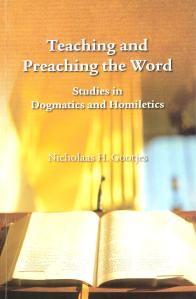Book Review: Teaching and Preaching the Word


Teaching and Preaching the Word: Studies in Dogmatics and Homiletics, Nicolaas H. Gootjes, Winnipeg: Premier, 2010. Soft cover, 420 pages, $17.00.
For over twenty years, Dr. Nicolaas (Niek) Gootjes served the Canadian Reformed Churches as a professor of dogmatics at our seminary. In that time he trained over 40% of currently serving Canadian Reformed ministers. This compilation of writings was assembled under the leadership of Dr. C. Van Dam as a token of gratitude for his faithful years of service. It was presented to Dr. Gootjes at a recent reception held to commemorate his retirement.
Teaching and Preaching the Word consists of a mixture of previously published articles in English and Dutch. Some of the articles are written at a popular level, others on a more scholarly plane. Many have never appeared before in English. All of them together represent everything that was good, true, and beautiful about my seminary dogmatics training.
On a formal level, the book is generally well-written and well-edited. The editor has nicely collated the chapters under various headings: Revelation, The Birth and Work of Christ, The Holy Spirit, The Sacraments, Other Dogmatic Studies, Reformed Confessions and Preaching. Unfortunately, in the process of scanning some of the articles, some typographical errors did creep in, but most readers will likely not catch them. What I appreciated most about Teaching and Preaching the Word was the fact that so many of the items included address contemporary problems. The editor made excellent choices.
Let me briefly mention some of the highlights. Controversies continue in the Canadian Reformed Churches about the relationship between science and Scripture. It’s timely then that almost all of Dr. Gootjes’ writings on that subject are republished in this volume. For instance, in chapters 1 and 2, he discusses the proper understanding of “general revelation” in article 2 of the Belgic Confession. Later, in chapter 11, he takes on voices in the Christian Reformed Church which equated creation and providence in the interests of making room for evolutionary theories about origins.
Another contemporary debate concerns the imputation of the active obedience of Christ. This is the teaching that all of Christ’s law-keeping is imputed to us as a part of our justification. Some figures associated with the Federal Vision movement have denied this doctrine or minimized its importance. In chapter 4, Gootjes firmly outlines the development of this doctrine, its presence in the Belgic Confession, its biblical basis, and its importance for preaching and teaching.
Among Federal Vision proponents and sympathizers we also sometimes find the error that says that all baptized children receive not only the promises of God in baptism, but also the very things that are promised. Gootjes deals with the promises of baptism in chapter 9 and examines the promises of the Triune God that are outlined in the first part of our Form for Infant Baptism. He especially focuses on the promise that the Spirit will dwell in us. He asks, “Can these words be applied to all children that are baptized? Does the Spirit dwell in all of them?” (184). Carefully he works through the historical, confessional, and biblical data, coming to the conclusion that the Form does not assert an existing situation, but summarizes what is promised to the covenant people of God.
Other highlights include Gootjes’ lengthy defense of catechism preaching (made at the ICRC in 1993) and his excellent chapter tracing the historical development of the concept of “stewardship” in the Reformed worldview. We also find some of his studies in the Belgic Confession, studies which laid the groundwork for his highly acclaimed book on that confession. Finally, there is a recent surge of interest in Herman Bavinck. PCA pastor Ron Gleason has a much anticipated biography coming out later this year – the first one in English. Moreover, a number of Bavinck’s books have recently been translated including his landmark four-volume Reformed Dogmatics. Appearing for the first time in English, Gootjes has a fascinating chapter on the structure and methodology of Bavinck’s Dogmatics. It concludes with a précis of his own vision for theological method – something that will bring an “Ah-ha!” moment to all of his former students.
There are many more wonderful things that I could say about this book, but let me conclude by drawing attention to the care and precision of its author. As a professor, Dr. Gootjes had a reputation for being meticulous. He was and is a much-beloved model of erudition, profundity, and piety. With him, everything has ultimately to be evaluated in the light of God’s authoritative Word. God richly blessed us with Dr. Gootjes and we give thanks to him from whom all blessings flow. Sure, there are places where I’ve put question marks in this book. For instance, I’m not convinced that Calvin was wrong about the sense of divinity (12). But there is no doubt that this book makes helpful contributions to the study of Reformed theology. It deserves a wide readership, not only in Canadian Reformed circles, but far beyond.
Teaching and Preaching the Word is available directly from Premier Publishing. E-mail them at books@premierpublishing.ca


